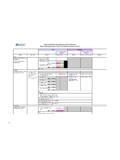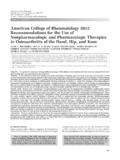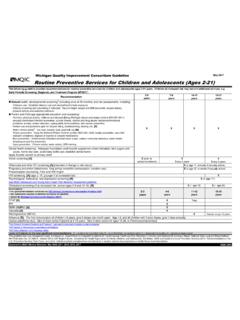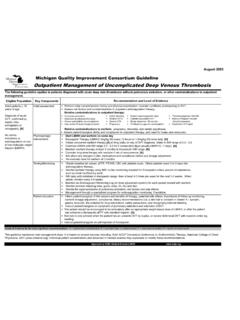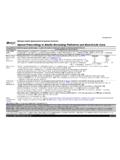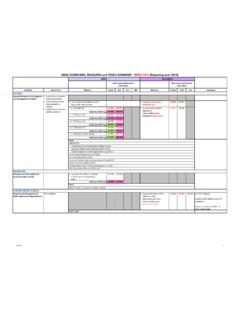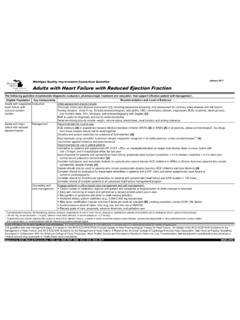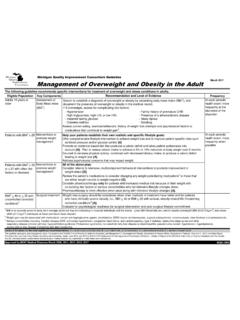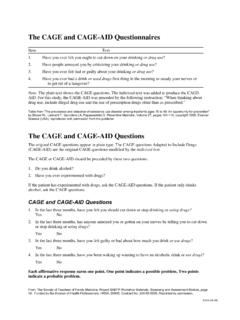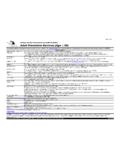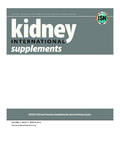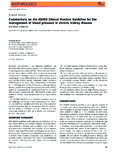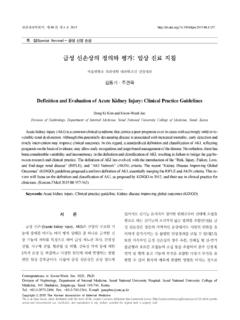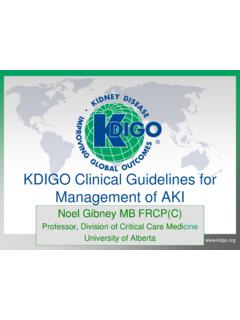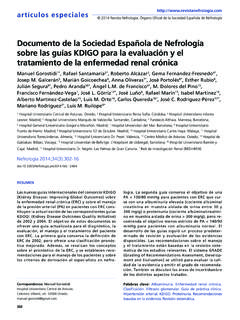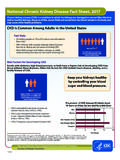Transcription of Michigan Quality Improvement Consortium …
1 November 2016 Eligible PopulationKey ComponentsScreening Testing for diagnosis and stagingRisk Factor Management &Patient EducationCore Principles of Treatment [D] clinical plan based on CKD stage and and Level of EvidenceFor patients at increased risk for CKD ( , diabetes mellitus, hypertension, family history of kidney disease, age > 55 years, obesity, metabolic syndrome, history of acute kidney injury) assess for markers of kidney damage: Measure blood pressure [A] at least two times/year. Urine dipstick for each routine health exam:Optimize management of comorbid conditions ( diabetes mellitus/glucose control, hypertension, urinary tract obstruction, cardiovascular disease)3, on therapeutic lifestyle changes: weight maintenance if BMI < 25, weight loss if BMI > 25, exercise and physical activity, nutrition therapy, moderation of alcohol intake, smoking management of risk patient of serious progressive nature of CKD and its medications for dose adjustment, drug interactions, adverse effects, and therapeutic levels.
2 Modify dosage for renal cleared medications, Metformin, vaccines: HBV, influenza, Tdap, and Pneumococcal Conjugate Vaccine (Prevnar ) and Pneumococcal Polysaccharide Vaccine (Pneumovax )Salt restriction for patients with CKD and self-management behaviors into treatment plan at all stages of CKD [B].Develop clinical plan based on disease stage [B].Stage 1 (GFR 90): Monitor GFR and microalbuminuria at least annually based on risk, smoking cessation, consider ACE and/or ARB therapy. BP goal 130/80 for macroalbuminuria (> 300) or diabetes mellitus, otherwise 140/90. Nephrology referral if 2 (GFR 60-89): Nephrology referral if GFR decline > 5 mL/min/yr, if macroalbuminuria > 300; maintain BP goals as above. Stage 3a (GFR 45-59): Nephrology referral if anemic or abnormal PTH, VitD, Ca, or phosphorus, or GFR < 45 mL/min. Avoid contrast, if possible. Avoid NSAIDs. Low-dose ASA 3b (GFR 30-44): Nephrology referral. Stage 4 (GFR 15-29): Nephrology co-management; consider case management if available.
3 CKD education and discussion of choices and options, advance care 5 (GFR < 15): Renal replacement therapy when creatinine and estimated GFR1. If < 60 and no prior GFR, repeat within 90 days to establish trend. Monitor GFR ratio2 (first morning or random spot urine specimen).Urinalysis, fasting lipid profile, electrolytes, BUN, CBC; review prior lab results. Michigan Quality Improvement Consortium GuidelineDiagnosis and Management of Adults with Chronic Kidney DiseaseThe following guideline recommends diagnosis and aggressive management of chronic kidney disease by clinical stage. All adults at increased risk for CKDA pproved by MQIC Medical Directors November 2008, 2010, 2012, 2014 (rev. May 2013), 2016 This guideline lists core management steps. It is based on Kidney Disease: Improving Global Outcomes (KDIGO) CKD Work Group 2012. KDIGO 2012 clinical Practice Guideline for the Evaluation and Management of Chronic Kidney Disease. Kidney inter., Suppl. 2013; 3: 1-150. Screening for, Monitoring, and Treatment of Chronic Kidney Disease Stages 1 to 3: A Systematic Review for the Preventive Services Task Force and for an American College of Physicians clinical Practice Guideline.
4 Ann Intern Med. 2012;156:570-581. Individual patient considerations and advances in medical science may supersede or modify these of Evidence for the most significant recommendations: A = randomized controlled trials; B = controlled trials, no randomization; C = observational studies; D = opinion of expert panel1 Units for GFR = ml/ m22 Albuminuria mg/24 hoursAdults with CKD3 Reference MQIC guidelines on diabetes, hypertension, lipids, and obesity4 Reference University of Michigan Health System clinical Care Guidelines on diabetes, hypertension, lipids, and obesity
